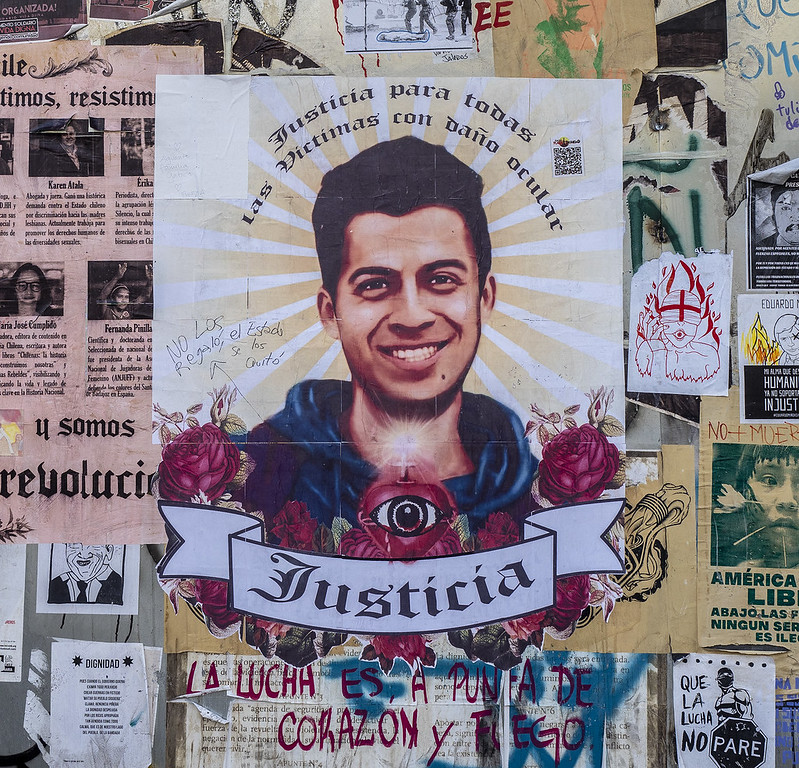The popular revolt 2019
People in different ambits, talk about their experiences, expectations, fears in these days in which the third anniversary of the social outbreak in the cities of the country is commemorated: “I remember as if it were yesterday when the discontent of the people became more real than before because it was not just 30 pesos for the rise of the metro or collective locomotion, but something that was carried inside for quite some time, a time bomb that in the end was activated in the discontent of a people humiliated and outraged in their rights, while others in a minority group continued to enjoy their privileges.”
“This is because of the neo-liberal system that continues to rule the country, which continues to mark discrimination not only socially, but mentally, culturally and economically.”
“Many of the demonstrations were peaceful but the failed State has used the repressive forces against students, against people with mental, psycho-motor, hearing, visual disabilities, regardless of the condition and origin of those people, they systematically outrage them, following the orders of Piñera’s declaration of war”.
The war declared on the people by La Moneda and its impunity to date
As illustrated by the report of the National Institute of Human Rights, of more than 3,000 complaints still open, less than 300 have been formalised. Worse still, of the more than 3,500 victims of violence by state agents, to date, almost 1,400 people have not even been summoned by the Public Prosecutor’s Office to at least hear their complaints first hand. The complaints seek justice for murder, torture and unnecessary violence, with specifications of eye trauma, injuries to other parts of the body, severe psychological abuse and more than 500 victims of sexual violence. Of these victims, almost 600 are children and adolescents.
More than 90 per cent of the state agents denounced have never been formalised in court. Of the ten percent that have been formalised, after three years only 14 convictions have been obtained (including that of the agent who blinded Fabiola Campillay, now an independent senator).
In this context, the Chilean Human Rights Commission (CCHDH), together with the Coordination of Victims and Relatives of Ocular Trauma, the Group of Victims of Violence by State Agents, and the Coordination of Victims of Buckshot, filed a complaint against Sergio Mico, the current former Director of the National Institute of Human Rights during the social outbreak, who comes from the Christian Democrat ranks. The action seeks to charge Mico with the crime of abetting crimes against humanity committed by agents of the state. This unleashed a scandal in the ambit of human rights and in Chilean society.
The political elite in their action and inaction in favour of impunity
DC deputies gave the PC an ultimatum to drop the complaints against Sergio Micco, if they want the party to respect the administrative agreement of the chamber that gave the presidency of the chamber to the communist deputy Carol Cariola, in the period ad portas.
It has also been revealed in recent days that the public prosecutor’s office is requesting emails from the former undersecretary of the interior in the Piñera government. The current Boric government claimed 5 months ago to have these incriminating emails on human rights violations, but today they say they do not exist.
In the meantime, Senator Campillay asks Boric to fulfil his campaign commitment to pardon “for humanitarian reasons” the young people arrested during the social unrest, and declares: “Our young people are not criminals, they are workers, students, housewives, hard-working women and men who one day wanted to fight for all our social rights”.
The deputy national prosecutor made it public that the prosecutor’s office is indeed handling around three hundred cases of sexual violence by state agents during the social unrest, which had been denied by the right wing, who asked Boric to retract his allusion in the commemorative speech given by the president from La Moneda.
This begins to reveal how barbarism is negotiated with in the ambits of power, showing the inhuman insensitivity of the national political class.
For citizens and common sense, the minimum requirement is that the law should be complied with and that impunity should not once again dominate our territory. It is not enough that decades afterwards the courts ask for forgiveness for not fulfilling the duties entrusted to them by the sovereignty of the people.
Three years after the popular revolt, which was an expression against the inhuman capitalism exercised by the powerful against their people, the agendas for dignity and social justice, for a more humane life, because the beautiful and brave people of this country deserve it, are still standing, with the determination that characterises the organised people.
Collaborative writing by Gladys Mendoza; Guillermo Garcés and César Anguita. Political Commission.






